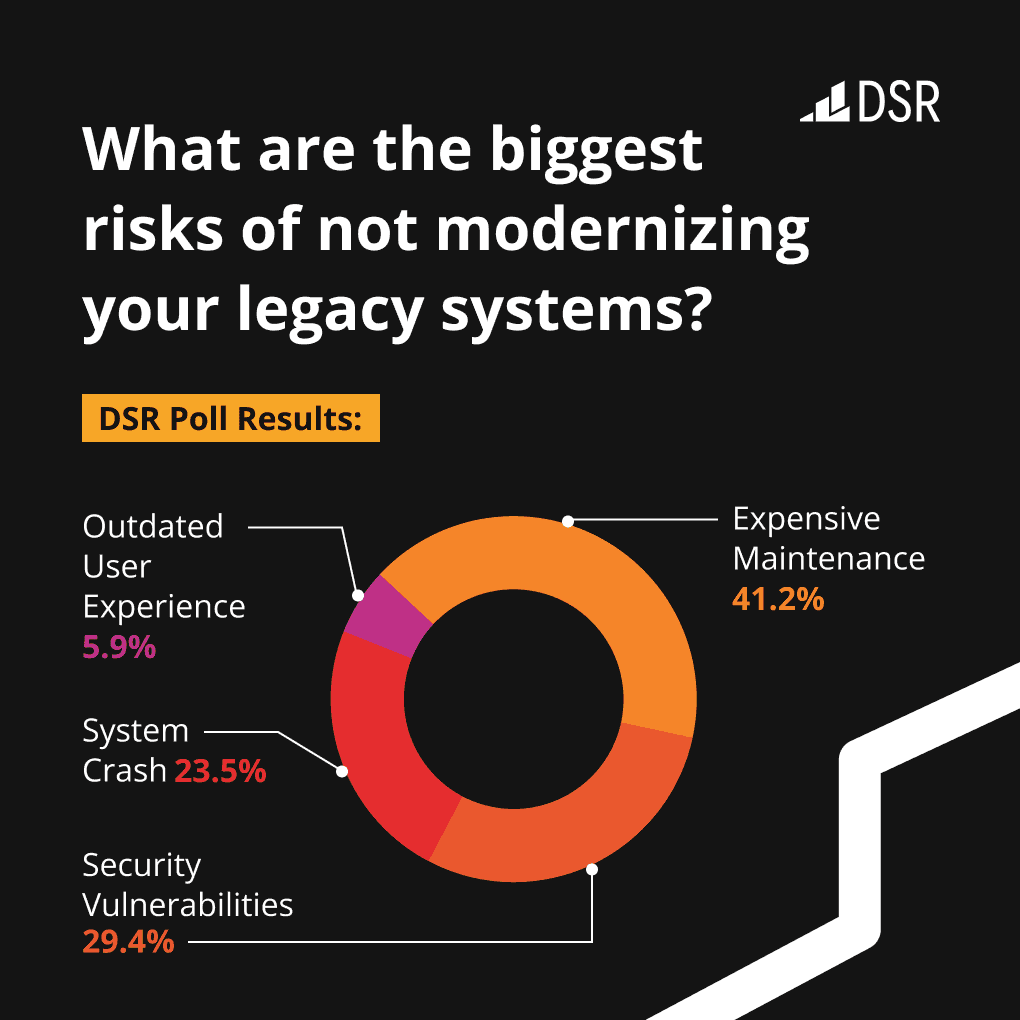Product managers and owners identify the biggest risks of not modernizing legacy systems
May 16th, 2024
DSR solicited feedback on LinkedIn about the top risks of not updating technology platforms. We received feedback from product managers, software developers and business managers. The risks are considerable:
Expensive Maintenance: Legacy systems are expensive to debug and maintain, which increases technical debt. Likewise, as time passes the knowledge and skills necessary to maintain these systems is often not available in-house and maintenance becomes an even greater drain on budgetary resources.
Outdated User Experience: Old user interfaces and a clunky user experience can deter customers from choosing your platform. An updated user experience and fresh interface can boost satisfaction among current users and help attract new ones to the platform.
Security Vulnerabilities: Legacy platforms do not possess up-to-date security features making them vulnerable to cyber-attacks. Platforms with older security mechanisms can leave users’ data exposed to threats, such as hacks or breaches, which is harmful to the performance and reputation of the system.
System Crash: Outdated software platforms are more susceptible to poor performance and loss of system functionality. An unreliable system that is prone to crashing and other performance issues can leave users frustrated and compel them to look for alternatives.
Based on feedback from respondents, 41.2% identified expensive maintenance costs as the biggest risk of not updating legacy systems. According to Deloitte, spending fewer resources on maintaining an outdated system provides more resources for innovation. Keep in mind, it is estimated that the average cost to maintain outdated platforms increases 15% YoY.
Maintenance updates are the tip of the iceberg when it comes to risks of not updating technology platforms. Respondents selected security vulnerabilities as the next riskiest consequence of not updating a legacy system, with 29.4% of votes. Respondents then chose system crashing and performance issues as their next concern in regards to legacy platforms. Lastly, 5.9% of respondents said that outdated user experience is the biggest liability that stems from not modernizing legacy systems.
Often owners may consider updating a system as the greater risk than addressing one system at a time. Mitigating potential risks that arise from outdated systems may seem like a tall order, but we find it effective for companies to phase their approach to specific problems presented by legacy platforms, such as:
New Feature Implementation – Expanding the capabilities of a platform, along with updating the UI/UX, can make a platform more powerful and attractive to potential users. Systems that provide cutting-edge tools stay competitive in markets with many alternatives.
Replatforming – Migrating a system from a desktop or on-premise server to the cloud can help reduce maintenance costs, enhance scalability and provide greater flexibility for users. Cloud based systems allow for greater collaboration between users, leading to higher customer satisfaction.
Data Security – The security and privacy of user data stored on a platform is of the utmost importance. Modern systems are better equipped to protect and secure data, especially when migrating large amounts of user data between systems or developing a new platform
DSR is well-versed in legacy system modernization and possess the expertise and experience to support modernization efforts for software platforms. Learn more at https://en.dsr-corporation.com/technology#system-development
DSR has experience in supporting companies’ efforts to modernize components of their legacy systems. Partnering with a specialized company like DSR helps ensure a successful update. By embracing modernization, businesses can transform their legacy systems into modern, efficient and competitive assets. Learn more about our specific Legacy System Modernization projects:
Laboratory Information Management System: https://en.dsr-corporation.com/project-examples/lims-modernization
Document Management System Modernization: https://en.dsr-corporation.com/project-examples/document-management-modernization
